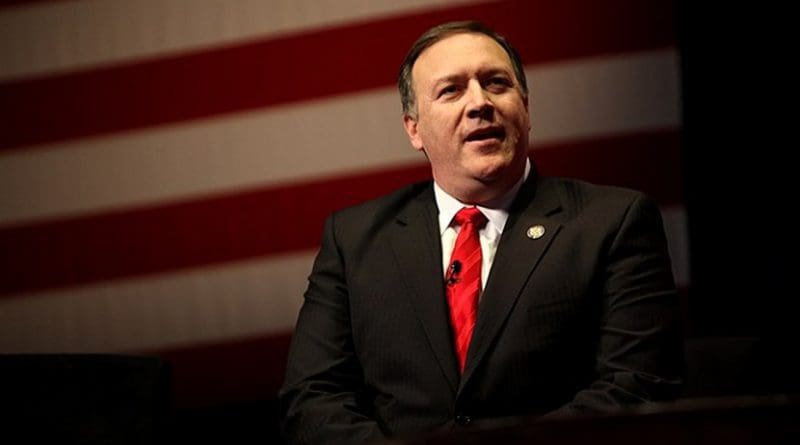Pompeo’s Visit, Panacea For Derailing Pak-US Relations Or Old Wine In New Bottle? – OpEd
The very basic and age-old concept of no permanent friends and foes in international politics seems to be still persistent specifically in the case of Pak-US relations. Since the start of formal bi-lateral relations between both countries back in the early years of creation of Pakistan, the Pakistani officials preferred US over USSR and right after that became a close ally of the United States joining SEATO and CENTO during 50s and 60s. But mutual mistrust kept on escalating at the same time.
The US, despite being a close ally of Pakistan did not support Pakistan in war of 1965 against arch rival India. The same dodge Pakistan had to bear in 1971 debacle supported by Indian assistance when despite promises the US fleet could not move further from Indian Ocean to save territorial integrity of its ally i.e. Pakistan. Recently, nuclear orientation of South Asia, Indian hegemonic designs supported by the US, skepticism against Pakistan’s role in ‘War on Terror’, and duality in dealing with Pakistan have collectively left negative impact on the bilateral relations.
Arrival of Secretary of State Mike Pompeo on his maiden visit along with the US Chairman of the Joint Chiefs of Staff General Joseph Dunford just a day before the Defense Day of Pakistan is an important step to lift the derailing relationship. But one must not forget the history of the US betrayal in crucial situations, such as embargoes of 1965 on Pakistan after the war. Many lessons are to be drawn from this long term ‘love-hate story’ of Pakistan and the US.
Although, current diplomatic mission of the US apparently has arrived with good intentions of reviving relations in the backdrop of quite a harsh announcement of withholding reimbursement amount US $300 million as part of Coalition Support Fund, which is yet to be resolved.
On the other hand, the very next day in India, there have been a display of exceptional warmth with sky high promises and affirmations of indispensable partnership on almost every important bi-lateral, regional and international issue. On 5th September, Secretary of State Pompeo along with other crew members met the Prime Minister Imran Khan, foreign minister and COAS of Pakistan to discuss present state of bi-lateral relations, peaceful settlement of Afghan issue, strengthening of military ties, and other matters of mutual interest.
The news briefings of Pompeo and company about the meetings with Pakistani officials show a good and hopeful start with the newly elected government signifying the realization for mutual understanding and frequent interactions at top level to resolve rifts in bi-lateral relations.
Similarly, Pakistan’s Foreign Minister Shah Mehmood Qureshi has also expressed hopes of revival of relations. Intentions seem to be good but skepticism still prevails viewing the traditional pragmatic pathways of the US policies. There are speculations that this visit is just to remind Pakistan of its US centered responsibilities i.e. to eradicate terrorist safe heaven, facilitate Afghan peace process and harmonize bi-lateral and regional agenda but let’s not forget these are also the core foreign policy issues of Pakistan itself. Much depends on how both states pursue their interests after this encounter. Will it be a mere diplomatic showoff, desperate longing or thoughtfully devised practical strategy to commence thoroughly? Sincere efforts based on realistic approach are pre-requisite for any kind of advantageous output.
Nothing yields results in international politics if there is absolute gain for one state and absolute failure for the other. For any diplomatic process to achieve high ranks, all concerned stake holders at least have something to cheer for. The US squad has shown satisfactory intentions. Similarly, Pakistan has given them full confidence to cooperate in all pertaining issues including talks with Taliban, expediting Afghan peace process, Terrorism combating efforts and economic concerns. But analysts should also consider the US mission’s activities and commitments in India because Indo-US growing cordiality has left Pakistan with much to concentrate considering geo-political and geo-strategic climate of South Asia. Pakistan celebrates 6th September’s historic defense of its territory against Indian aggression; therefore, any kind of regional development regarding India will affect its geo-strategic muscles simultaneously.
Empirical statistics provide detailed account of economic and military advantages that Pakistan has enjoyed in times of smooth relationship with the US though they are very few. At the same, the rotten relations also bring forth the sufferings of Pakistan under US embargoes imposed time and again hampering Pakistan to prosper on its own prescribed terms and conditions. Wars with India, nuclear explosions and a few ‘war on terror’ phases faced certain setbacks caused by the US illogical demands. On the contrary, countering Russian invasion of 1979 with the help of the US and early years of 21st century after 9/11 brought significant positive economic and defense related cooperation and the US aid.
The real disputes have always been ignited with the US relationship with India and situations in Afghanistan. The US officials visit is appreciable to break the ice in bi-lateral relations. Equally commendable is Pakistan’s civil-military one-page agenda showing great responsibility of preserving national interest. Suspicions may arise at times but the solid urge to move forward than mere talks is the key to achieve positivity in the bi-lateral relations. With the days passing by, revival of Coalition Support Fund and removal from FATF list will solidify Pak-US relations otherwise the outcomes of this tour will only be like old wine in a new bottle not a panacea for derailed bi-lateral relations.
*Fateh Najeeb Bhatti, Research Associate at Strategic Vision Institute Islamabad, M. Phil IR Quaid e Azam University Islamabad

